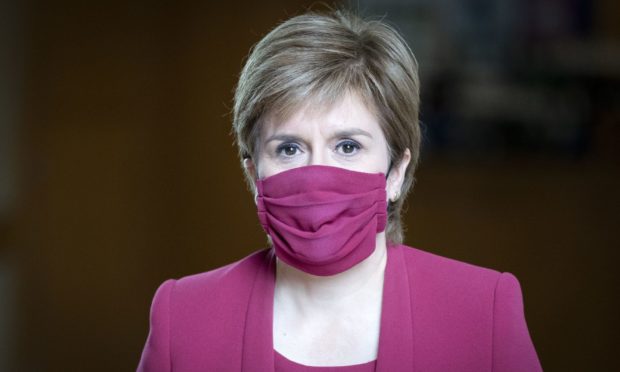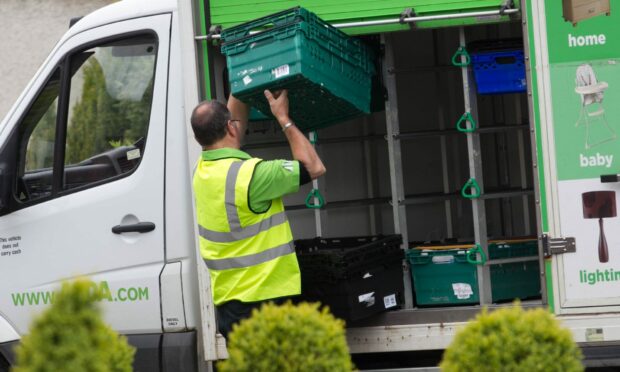Changes to self-isolation rules will allow “essential staff” to stay at work to keep critical services going in health, social care, transport and the provision of food supplies.
First Minister Nicola Sturgeon announced the new guide, ahead of schedule, with strict conditions requiring applications through a Scottish Government website.
Staff must be double-vaccinated, with the second shot at least two weeks previously. They will need to have a negative PCR test and agree to daily lateral flow tests.
Exemptions only apply to staff who voluntarily agree not to self-isolate.
‘Lifeline services’
In a statement, Ms Sturgeon confirmed: “It is essential that lifeline services and critical national infrastructure are maintained and we are implementing these changes now – ahead of possible changes to self-isolation rules for close contacts that may apply more generally in future – to ensure staff shortages do not put key services at risk.
“We have seen significant staff shortages in a small number of organisations in recent days and we have worked with them to protect services. Applications for exemptions are being considered from today and we will consider applications as they come in.
“Clinical evidence tells us we can safely and effectively release some critical staff from self-isolation, with appropriate safeguards. However, this is a very limited change at this stage, to be applied on a case by case basis and only where absolutely necessary.
“We will not allow key services to be threatened by staff shortages but equally we must continue to protect public health.”
The SNP Government had already planned to ease rules for health and social care workers from August 9, using more testing in place of isolation, as the country inches out of emergency measures.
But there were growing concerns at the lack of produce in some shops as more people are forced to self-isolate after receiving alerts on Covid contact tracing phone apps – dubbed the “pingdemic”.
Prime Minister Boris Johnson declared “freedom” from key public health measures in England on July 19 despite the rapid spread of the Delta variant, first identified in India.
The problem isn’t the pingdemic, it’s the pandemic.”
– Stephen Reicher
The major change was immediately blamed on the massive rise in secondary contacts of cases, which put wider British infrastructure under immense pressure.
On Friday morning, behavioural science expert Stephen Reicher, a professor at St Andrews University, criticised the UK Government’s focus.
“The real problem is the number of infections,” he said. “The problem isn’t the pingdemic, it’s the pandemic.”
He called for better messaging for the public, the continued use of face covers and better ventilation to lower infection risk.
What is happening in England?
In England, the UK Government has now announced supermarket depot workers and food manufacturers will be exempt from quarantine rules.
The scheme there will allow an expected 10,000 workers to take daily tests regardless of vaccination status.
The plan begins at 15 supermarket depots followed by another 150 next week. It won’t apply to shop staff.
A record 618,903 people were told to self-isolate in England and Wales in the week before the Prime Minister lifted restrictions – despite a massive and ongoing spike in Covid cases.
The focus is not just on Britain’s under-strain infrastructure. The UK Government is also bringing in plans, already expected, to allow key industries in England such as transport, emergency services, border control, energy and local government, among others. It will apply to people who are fully vaccinated.
Scottish political reaction
Scottish Conservative leader Douglas Ross, a Highlands and Islands MSP, said Ms Sturgeon’s changes for Scotland are a cautious step in the right direction.
“It is right Nicola Sturgeon has acted now, despite the SNP Government saying even last night that any changes would not be brought in until next month,” he said.
“However, many questions must be clarified by the SNP if these changes are to have the right effect. They must be clear on who exactly will qualify for an exemption and for how long an exemption will last for.
“There are also real concerns that the SNP are going to swamp businesses and individuals with layers of bureaucracy. The application process should be as smooth as possible at a time when businesses are already under huge pressure.”
North East Fife MSP Willie Rennie, who recently announced his decision to quit as Scottish Lib Dem leader, said: “I have been calling for something similar for some weeks as the risk of staff absence because of self-isolation is threatening to collapse essential public services like hospitals, GP surgeries and home care. That would have a significant impact on the health of people across the country.
“If the safeguards are right and the risk of the spread of the virus is low then this would be a sensible step.”

